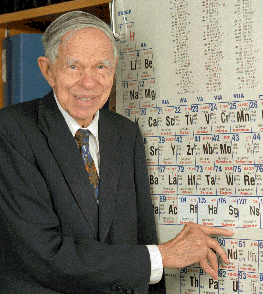Great Throughts Treasury
This site is dedicated to the memory of Dr. Alan William Smolowe who gave birth to the creation of this database.

Glen Therodorei Seaborg
American Physicist, Nuclear Chemist and Nobel Laureate
"I believe that one of the characteristics of the human race, possibly the one that is primarily responsible for its course of evolution, is that it has grown by creatively responding to failure."
"If an unfriendly foreign power had attempted to impose on America the mediocre educational performance that exists today, we might well have viewed it as an act of war."
"One of the first laws against air pollution came in 1300 when King Edward I decreed the death penalty for burning of coal. At least one execution for that offense is recorded. But economics triumphed over health considerations, and air pollution became an appalling problem in England."
"People must understand that science is inherently neither a potential for good nor for evil. It is a potential to be harnessed by man to do his bidding. "
"Atomic power will make electricity too cheap to meter."
"For faculty members at the university, we also expect that they continue to be scholars.... That's the idea, to have faculty members who are engaged in teaching people about what the world is like in their field right now, rather than what it was when somebody wrote a book 10 or 20 years ago."
"I was a 28-year-old kid and I didn't stop to ruminate about it. I didn't think, 'My God, we've changed the history of the world!' [on discovery of Plutonium]"
"The education of young people in science is at least as important, maybe more so, than the research itself."
"There is a beauty in discovery. There is mathematics in music, a kinship of science and poetry in the description of nature, and exquisite form in a molecule. Attempts to place different disciplines in different camps are revealed as artificial in the face of the unity of knowledge. All literate men are sustained by the philosopher, the historian, the political analyst, the economist, the scientist, the poet, the artisan and the musician."
"Our Nation is at risk. Our once unchallenged preeminence in commerce, industry, science and technological innovation is being overtaken by competitors throughout the world ... the educational foundations of our society are presently being eroded by a rising tide of mediocrity that threatens our very future as a Nation and as a people. What was unimaginable a generation ago has begun to occur — others are matching and surpassing our educational attainments."
"If an unfriendly foreign power had attempted to impose on America the mediocre educational performance that exists today, we might well have viewed it as an act of war. As it stands, we have allowed this to happen to ourselves ... We have, in effect, been committing an act of unthinking, unilateral educational disarmament."
"Surrounded by dazzlingly bright students, I was uncertain I could make the grade. But taking heart in Edison's dictum that genius is 99 per cent perspiration, I discovered a pedestrian secret of success. I could work harder than most of them."
"I consider the fact that we do research that is competitive with other people at the best universities in the world important.... If we aren't doing that, we should be."
"We have, in effect, been committing an act of unthinking, unilateral educational disarmament."
"The modern technological world appears overwhelming to many people. It drives some to pessimism and despair. It makes others doubt the future of mankind unless we retreat to simpler lives and even to the ways of our ancestors. What these people fail to realize is that we cannot go back to those ways and those days. Furthermore, for all our difficulties, life today is far better for more people and the possibilities for the future can be brighter than ever if we develop not only new knowledge, but a greater faith and confidence in the human mind and spirit."
"We travel when we can to do experiments because we're driven in our research by problems we want to solve."
"You have to separate the use of radioisotopes from the development of nuclear weapons. Nature made nuclear weapons possible, and so it was in our national interest to be in the forefront with the atomic bomb. We had no choice. I see no advantage for Hitler to have gotten the bomb first. But if you're asking me, do I wish the laws of nature were such that it would not have been possible to make nuclear weapons, my answer is: God, yes."